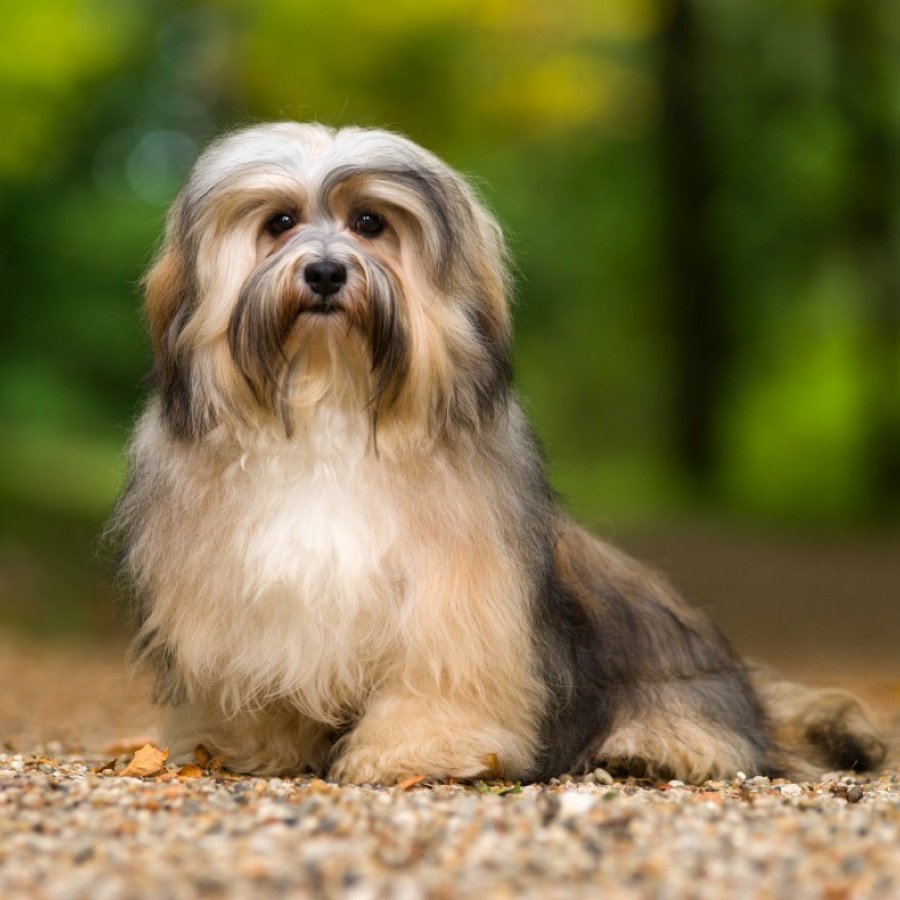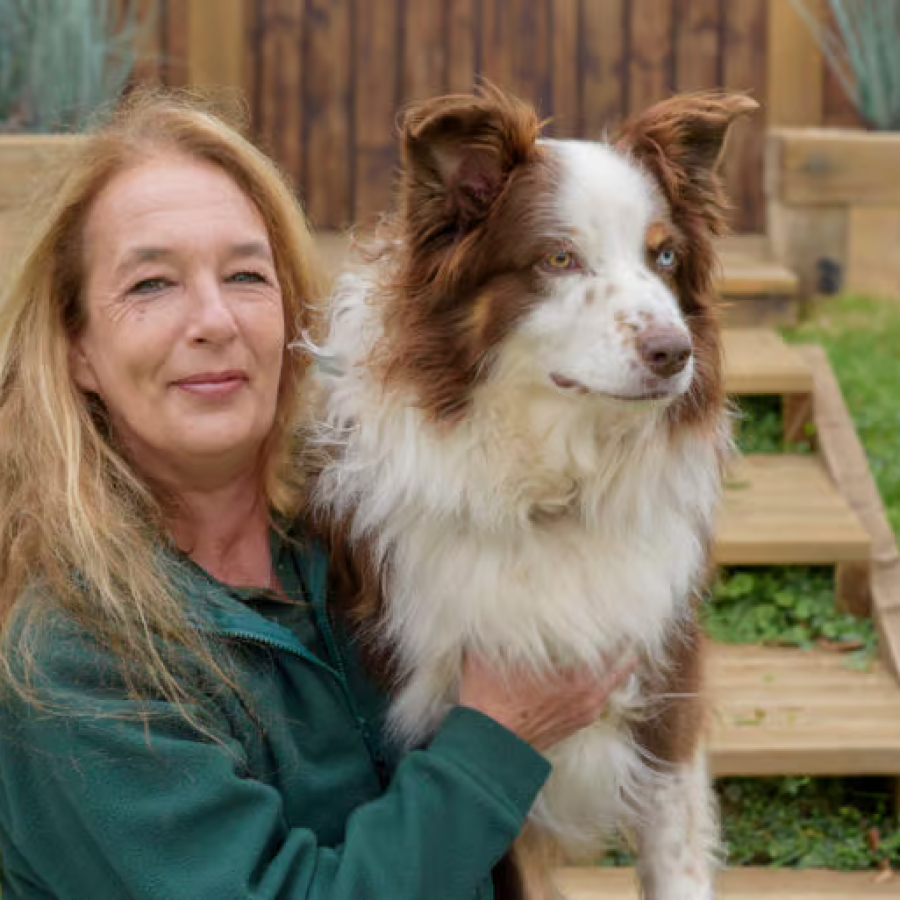
Havanese Dog Breed
The Havanese is a robust, bright and affectionate breed. Perfect for fun-loving, high-energy families!

The Havanese is a robust, bright and affectionate breed. Perfect for fun-loving, high-energy families!
Havanese are a happy and affectionate companion breed. They’re an extremely loyal friend and thrive on companionship; so won’t cope being left alone for extended periods.
Havanese suit first time dog owners, families and more mature people too – provided they have time for the upkeep of a Havanese’s long silky coat.
The Havanese is incredibly affectionate and loyal. They make excellent snuggle buddies and adore being the centre of your world. This loyal and loving nature means they can struggle if left home alone. They love to play and have lots of energy but don’t need a huge amount of exercise, which is ideal for busy families with children.
They make excellent watchdogs but will also bark when excited too.
Their coat requires daily attention if you decide to keep it long.
They are very bright and love to please. As long as their needs are met, you will always have a smile on your face if you live with a Havanese.
Disclaimer
While these breed traits give a general idea of what to expect from a specific type of dog, it's important to remember that every dog is unique. Just like people, each dog comes with their own distinct personality, quirks, and characteristics!

The Havanese can be a great choice for families. They are said to be more robust than most other small breeds. They’re very playful and like to entertain as well as be entertained, which is great for children to get involved in.
If you choose to keep their coat long be aware that very young children might try to grab or pull it which will be painful and could result in a snap.
Their affectionate nature also means that they make great snuggle buddies at the end of each day, which will help everyone wind down before bedtime.
Yes! If you are looking for a shadow, a lapdog, or a full-time friend the Havanese is a great choice. They were bred for companionship; therefore, they have an innate desire to be with you.
Whilst this is a wonderful benefit it’s also a big responsibility. Havanese really don’t like being alone and this can be very limiting if you go out to work or have a busy social life. With gentle, slow, training they’ll be able to cope for a couple of hours on their own, but not much longer.
If you have a young family, work from home, or are retired then the Havanese could be the right choice for you.
Yes! They love to play. Especially games that involve them chasing their toys and bringing them back to you.
Havanese are a very bright breed and play is a great way to engage their brains.
Like all dogs they love to use their nose, so hide and seek or scent games are very rewarding. These games are something the whole family can get involved in. Hiding their toys and/or treats around the house and garden is great fun for everyone. Being robust little dogs they also love to play games of tuggy.
So, if you are considering adding a Havanese to your home be sure you can accommodate their need for frequent play sessions. If you don’t feel you have enough time or energy, they may not be the breed for you.
This spirited little dog does tend to like the sound of their own voice. They will certainly let you know when someone knocks on your door or if they sense something out of the ordinary.
They may also bark when excited, so your visitors need to be prepared for a friendly but vocal greeting.
Barking may also signal that they aren’t getting enough exercise or attention, so take it as your cue to start a game or go for a walk!
Their tendency for barking should also be considered if you live in a flat or built-up area.
If your Havanese receives the right amount of physical exercise, mental stimulation and companionship, behavioural issues can be avoided or kept to a minimum.
Failure to do so can result in nuisance barking, stealing items or destructive behaviour.
As a companion breed they are prone to separation related issues. If their home alone training isn’t built up slowly or they are left too long these separation issues can become harder to manage.
The Havanese’s sociable and friendly nature, combined with their short stature, means they’re likely to jump up at people in their excitement to greet them. Through training you can discourage this behaviour.
As with ALL dogs, if their needs are met, they are far easier to manage and train.
This entertaining little breed needs a home where they can be a full time companion. They need to live with someone who can dedicate time to walks, grooming and play sessions every day. As a friendly, sociable breed they suit both families and adult homes alike.
If well socialised as a puppy they can live happily with other dogs. They can also live with cats and small animals if they are introduced when young.
Despite being an active little breed, the Havanese does not require a huge amount of physical exercise. Two 20-minute walks a day, where they can enjoy running around and chasing their toys, will be enough to keep them fit.
However, they’re very smart and certainly need a good amount of mental stimulation to stay happy. The use of puzzle feeders and activity toys is an easy way to help them feel satisfied.
Trick training is another fun way of getting them to use their brain.
They may be small, but it will still take a considerable amount of time to meet their physical, mental and emotional needs.
The Havanese is a bright little breed that needs mental stimulation, training is a great way to satisfy this need.
They’re motivated by food, toys and praise, so excel when positive reinforcement methods are used.
Socialisation and habituation is essential for them to learn how to interact with, and when to ignore, sights and sounds they’ll encounter in everyday life. This sets a solid foundation for basic training.
Puppies' brains are like sponges when it comes to learning, so be sure to make the most of their puppyhood.
Adolescence is challenging for all breeds and the Havanese is no exception. It’s a stage where it’s normal for them to test their boundaries. Hang in there, your hard work and perseverance will be rewarded once they reach maturity.
If their needs are met and kind, fair, and effective training is given then your Havanese is less likely to develop behavioural issues.
Havanese are a low shedding breed, but their grooming needs are high, especially if you choose to keep their coats long.
Their coats will need daily attention to keep them knot free.
You will need a slicker brush to remove any dead under-coat and a comb to brush the feathering on their legs and ears.
Staying on top of their coat condition will help keep the grooming experience positive for them. If you struggle with this, you might want to consider having them professionally clipped 3 or 4 times a year. Even if you keep their coat short it’s still worth going over them with a pin brush once a day. This also gives you the opportunity to check for any lumps, cuts or unwanted parasites.
Like all pedigree breeds the Havanese can be prone to certain medical conditions. It’s always essential to source a puppy from a reputable breeder that carries out the relevant health tests on their breeding stock and offspring. Conditions to consider are:
• Patellar Luxation – slipping kneecaps
• Liver shunt – where blood bypasses the liver
• Eye cataracts
• Progressive Retinal Atrophy
• Heart disease
Deafness is common in white Havanese so these puppies should have their hearing tested before going to their new home.
If you purchase a health tested puppy and they lead a healthy lifestyle, eat a nutritious diet and have regular veterinary check-ups you can expect your Havanese to live well into their teens.
I don’t require a huge amount of exercise – two 20-minute off lead walks a day will keep me happy, especially if they involve me chasing after my toys!
I’m very bright and love using my brain. Puzzle feeders and activity toys are great fun. I also love learning new tricks and playing games where I sniff things out.
I love learning new tricks and doing mini agility in the garden. Teach me a solid recall and not to jump up at people so I can exercise off lead.
You should expect to pay between £1500 - £2000 for a pedigree Havanese puppy.
The set-up costs for any puppy can run to several hundred pounds. This includes food, bowls, beds, collar, harness, lead, toys, stairgate, and puppy pen etc.
The ongoing costs include, food, vaccinations, insurance premiums, parasite control and grooming costs.
Take our quiz to discover which breed is right for you
Take our quizPlease call our pet support line on 0300 303 9333 (7 days a week – 8.30am - 4pm)